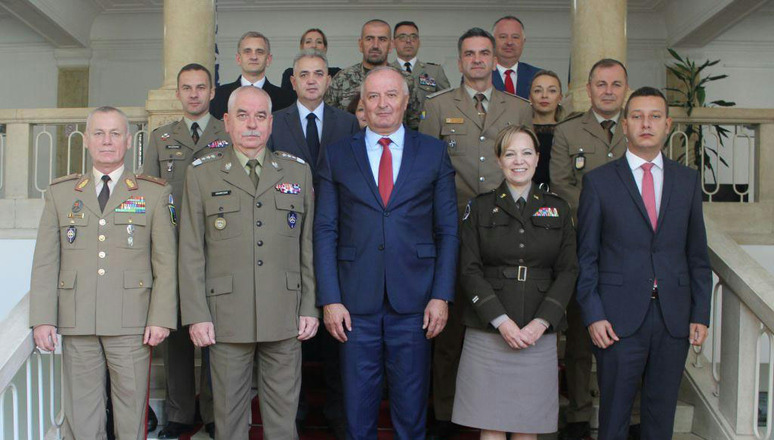Director General of the NATO International Military Staff visits Bosnia and Herzegovina
From the 21st to 22nd September 2023, the Director General of the NATO International Military (DGIMS), Lieutenant General Janusz Adamczak was in Bosnia and Herzegovina, where he met with the Chief of Joint Staff of the Armed Forces of Bosnia and Herzegovina, the Minister of Defence as well as various senior military and political high-level officials. The visit was a welcomed opportunity to discuss a stronger partnership between NATO and Bosnia Herzegovina, as well as the security priorities in the Western Balkans, in particular against the backdrop of the most complex and unpredictable security environment since the end of the Cold War.

On the first day of the visit, Lieutenant General Adamczak met with the Chief of Joint Staff of the Armed Forces of Bosnia and Herzegovina, Lieutenant General Senad Mašović. Discussing the country’s contributions to the Alliance since becoming a Partner in 2006, the Director General expressed his appreciation for Bosnia and Herzegovina’s contributions to the shared Euro-Atlantic security including by contributing troops to NATO missions; by training NATO and Partners troops during its annual disaster preparedness exercise; and offering specialised Explosive Ordnance Disposal and Military Police units to the NATO Response Force.
Moving on to the Camp Butmir, later in the morning, the NATO Military Delegation had the opportunity to visit the Peace Support Operations Training Centre (PSTOC) – a NATO accredited Education and Training facility. Lieutenant General Adamczak delivered a lecture to attending staff members, providing a snapshot of NATO’s main threats and challenges. He also touched upon the new Defence Capacity Building package for Bosnia and Herzegovina endorsed by Allies in February 2023, as part of NATO’s stepped up effort to help build partners’ capabilities and strengthen their resilience. The assistance package will strengthen the country’s defence and security capabilities, including in areas such as crisis management, cyber defence, aero-medical evacuation and countering terrorism.
The programme continued with a visit to NATO Headquarters Sarajevo, whose primary mission is to advise and assist Bosnia and Herzegovina’s institutions and authorities on defence and security sector reform as well as other NATO Partnership for Peace (PfP) activities. The meeting with its Commander, Brigadier General Pamela McGaha, provided an opportunity to discuss the key role played by the HQ in the region. “A stable and secure Bosnia and Herzegovina and a peaceful Western Balkans are of strategic interest for the Alliance”, he stressed, highlighting that “NATO’s commitment to helping bring peace, security and prosperity to the region is steadfast”. Lieutenant General Adamczak further elaborated on the long-standing and mutually beneficial partnership between NATO and Bosnia and Herzegovina, which is based on constructive dialogue, mutual respect and practical cooperation. He added that NATO’s partnership with the European Union is also instrumental to such commitment: “Together, we contribute to the stability and security in the Western Balkans”.
This point was reiterated in his exchange with EUFOR Commander, Major General Helmut Habermayer at EUFOR Headquarters in Sarajevo: “EUFOR, just like NATO Kosovo Forces too, has been a stabilising force in the Western Balkans – safeguarding peace and security in the region”, said the Director General. He further stressed NATO’s full support to the important role of the EU-led Operation Althea thorough the Berlin Plus Arrangements as well as the work of the High Representative in Bosnia and Herzegovina.
Back to Sarajevo, the visit concluded the following day with a meeting between Lieutenant General Adamczak and the Minister of Defense of Bosnia and Herzegovina, Mr Zukan Helez. During their talks, the Director General commended the ongoing reforms Bosnia and Herzegovina has implemented in its defence sector, including across its Armed Forces – one of the country’s strongest multi-ethnic institutions. He further encouraged the country to take this important progress even further, stressing NATO’s steady commitment to a strong dialogue and practical cooperation as we move forward. The country’s Reform Programme with NATO is currently the main framework for cooperation, aimed to guide the country’s reform efforts as it continues to pursue its Euro-Atlantic path.
